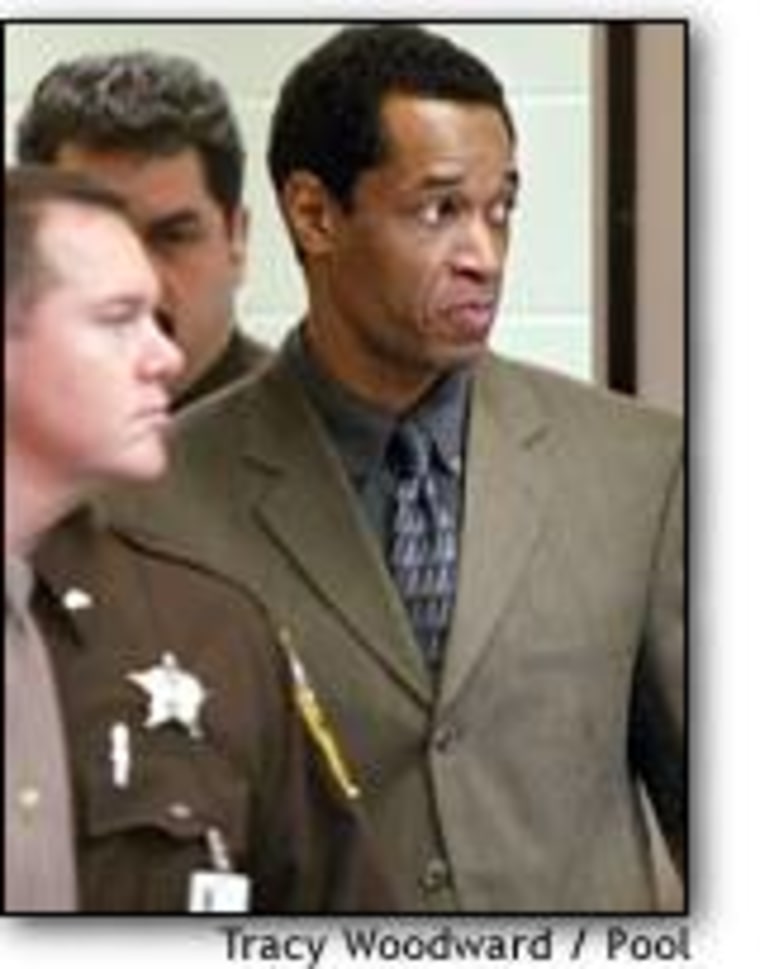Jury selection began Monday in the capital murder trial of sniper suspect Lee Boyd Malvo, while in another courtroom 15 miles away prosecutors rested their case against fellow defendant John Allen Muhammad.
SHORTLY BEFORE jurors were brought in Monday, Malvo, 18, stood before the judge in a courtroom Chesapeake, Va., and pleaded innocent to murder charges in the shooting of FBI analyst Linda Johnson, killed during the three weeks of sniper attacks that terrified the Washington area last fall.
“Not guilty,” Malvo replied in a clear voice each time he was asked for his plea to two counts of capital murder and to one count of using a firearm in a felony.
When the judge asked if he was ready for trial, he answered, “Yes, ma’am.”
Defense attorney Craig Cooley told Circuit Judge Jane Marum Roush that he would present a defense of innocent by reason of insanity.
The defense plans to argue that Malvo was so brainwashed by Muhammad, 42, that he either did not know what he was doing or could not control himself.
A RISKY DEFENSE
It likely will be a tough sell - and risky.
Studies have indicated that defendants who mount insanity defenses generally have higher conviction rates than those who don’t, said Thomas L. Hafemeister, director of legal studies at the Institute for Law, Psychiatry and Public Policy in Charlottesville.
“A lot of people see insane individuals as both very bad and very scary,” said Hafemeister, who also teaches at the University of Virginia law school. “The risk for the defense is that if they fail to convince the jury, then essentially they have a defendant who has acknowledged doing the deed and being mentally unstable, which creates a very scary person in the minds of the jurors.”
Malvo and Muhammad are being tried for two different killings, both in northern Virginia in October 2002. Both men face the possibility of the death penalty if convicted.
MUHAMMAD TRIAL PROSECUTION RESTS
Prosecutors in Muhammad’s trial concluded their case at the beginning of the fourth week of testimony Monday in Virginia Beach, Va. They are trying to convince a jury that Muhammad exerted control over Malvo, so much so that he should be held responsible for the shootings that killed 10 and wounded three in the Washington area.

In the final prosecution testimony in Muhammad’s trial, Edward Clarke, director of security for Montgomery county, Md., public schools, talked Monday about how the attacks prompted his schools to implement a countywide lockdown, called “code blue,” for the first time.
Attendance was down to less than 10 percent at some schools before the suspects were finally captured, he said.
Clarke’s testimony was meant to bolster prosecutors’ contention that the snipers engaged in a form of terrorism, the basis for one of the capital murder charges against Muhammad and Malvo.
Throughout Muhammad’s trial, prosecutors have combined emotional testimony from victims and victims’ relatives with forensic evidence, including DNA linking Muhammad to a rifle sight found in his car. Muhammad is on trial only for one killing, but the prosecution needs to prove participation in multiple killings or terrorizing of the public to get the death penalty.
It remains unclear who actually pulled the trigger in each of the shootings.
Investigators have testified in Muhammad’s trial that Malvo’s fingerprints were on the .223-caliber rifle used in the sniper killings, and that his DNA or fingerprints were found on evidence from several of the scenes.
MUHAMMAD THE ‘MOVING SPIRIT’?
But while prosecutors in Malvo’s case say Malvo has admitted committing many of the shootings and laughed and bragged about the shootings to interrogators and prison guards, Muhammad’s prosecutors argue it doesn’t matter who pulled the trigger.
They say Muhammad, who referred to Malvo as his son and plunged him into a lifestyle of rigor and discipline, was the “moving spirit.” That most of the evidence can be traced to Malvo only shows how carefully Muhammad controlled the situation, they contend.
Malvo’s defense lawyers argue that he only confessed to protect Muhammad, and that Muhammad was the mastermind of the sniper attacks.
“Our strategy is their strategy,” Malvo lawyer Michael Arif said earlier. “If you watch the prosecutors (in Muhammad’s case) carefully, they will never put on evidence that Lee was the shooter in any of the shootings in question.”
During jury selection Monday for Malvo’s trial, Roush told potential jurors that the trial is expected to last six weeks, and she asked them to be patient.
In Muhammad’s case, Circuit Judge LeRoy F. Millette Jr. sent the jury home after the prosecution rested its case. Tuesday is a holiday, and the defense was expected to begin presenting its case Wednesday.
Millette said he also would rule Wednesday on a request by defense lawyers to drop the two death penalty charges against Muhammad.
Defense lawyers argued that only the triggerman can get the death penalty under the capital murder charge alleging multiple killings and that prosecutors presented no evidence that Muhammad actually shot Dean Harold Meyers. They also say there was no evidence Muhammad engaged in a form of terrorism and that prosecutors didn’t prove he exerted the degree of control over Malvo required under that charge.
© 2003 Associated Press. All rights reserved. This material may not be published, broadcast, rewritten or redistributed.